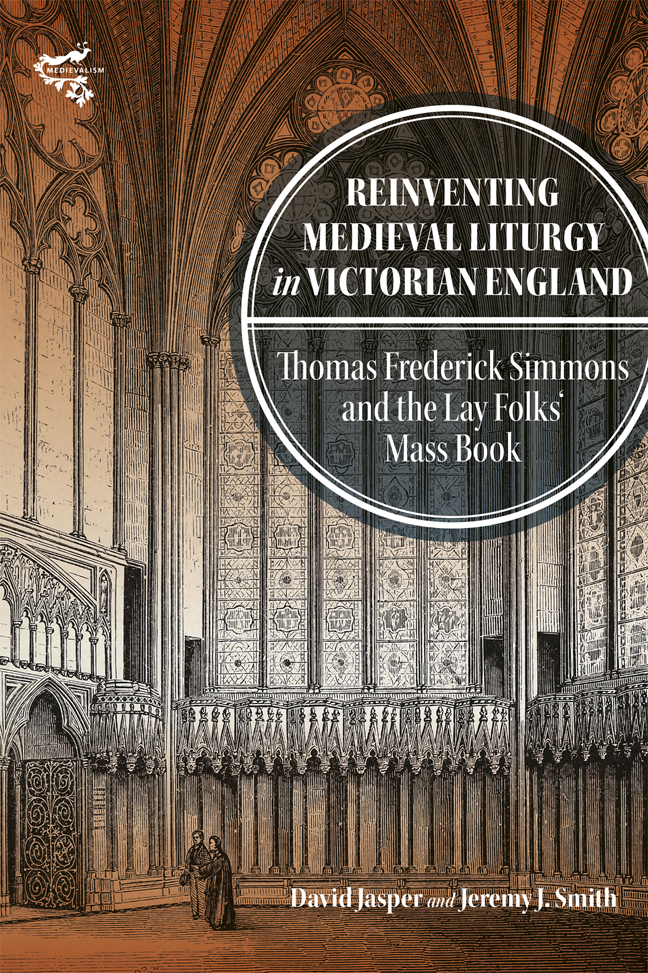 Reinventing Medieval Liturgy in Victorian England
Reinventing Medieval Liturgy in Victorian England Book contents
- Frontmatter
- Dedication
- Contents
- List of Plates
- Preface
- A note on citations
- List of abbreviations
- Introduction: Imagining the Past
- 1 Thomas Frederick Simmons and The Lay Folks’ Mass Book
- 2 Re-imagining Medieval Devotion: Nineteenth-Century Conceptions of the English Church
- 3 Simmons and the Early English Text Society
- 4 Simmons as Editor: The Philologist
- 5 Simmons as Editor: The Liturgist
- 6 Simmons as Parish Priest, and Liturgical Reform in the Victorian Church of England
- 7 The Afterlives of The Lay Folks’ Mass Book
- Conclusion: Liturgical Moments in Time
- Plates
- Appendix I The Lay Folks’ Mass Book: Text and Translation
- Appendix II The Lay Folks’ Mass Book and the Sarum Rite
- Bibliography
- Index
- Miscellaneous Endmatter
3 - Simmons and the Early English Text Society
Published online by Cambridge University Press: 02 March 2024
- Frontmatter
- Dedication
- Contents
- List of Plates
- Preface
- A note on citations
- List of abbreviations
- Introduction: Imagining the Past
- 1 Thomas Frederick Simmons and The Lay Folks’ Mass Book
- 2 Re-imagining Medieval Devotion: Nineteenth-Century Conceptions of the English Church
- 3 Simmons and the Early English Text Society
- 4 Simmons as Editor: The Philologist
- 5 Simmons as Editor: The Liturgist
- 6 Simmons as Parish Priest, and Liturgical Reform in the Victorian Church of England
- 7 The Afterlives of The Lay Folks’ Mass Book
- Conclusion: Liturgical Moments in Time
- Plates
- Appendix I The Lay Folks’ Mass Book: Text and Translation
- Appendix II The Lay Folks’ Mass Book and the Sarum Rite
- Bibliography
- Index
- Miscellaneous Endmatter
Summary
The Early English Text Society and its nineteenth-century editors
Thomas Frederick Simmons was, therefore, a clergyman whose theological and ecclesiastical formation was derived from the Oxford Movement and its aftermath. However, he is remembered, if at all now, for something that he might be presumed to have thought of as a secondary, if complementary, part of his life: as an editor for EETS. Simmons was demonstrably an active member of the contemporary EETS community. He subscribed to all its volumes, and commented regularly in his edition on its policies and on discussions with the Society’s worthies. It is to the place of EETS in Simmons’ life and times that we will now turn.
EETS remains today the most academically-prestigious locus for the publication of editions of Old and Middle English literary texts, as proudly claimed on its website: ‘Without EETS editions, study of medieval English texts would hardly be possible’. Those undertaking such study are clearly conceived of as being a particular kind of person; as the website goes on to state: ‘Editions [of EETS] are directed at a scholarly readership rather than a popular one; though they normally provide a glossary and notes, no translation is provided.’
‘Popular’ is, perhaps understandably, undefined by EETS. In the twenty-first century, ‘scholarly’ would seem to equate to the world of the ‘professional academic’, and most present-day subscribers to EETS are university libraries, or researchers and students affiliated to universities, or scholars working in such specialised fields as academic librarianship or historical lexicography. This last group include researchers employed by the great historical dictionaries of record, such as the Oxford English Dictionary (hence OED), the Middle English Dictionary, and the Dictionaries of Old English and Scots Language. Comparatively few (even though there are a few still) are ‘independent scholars’.
In 1864, however, when EETS was created, things were rather different. The founding figures of EETS – Frederick James Furnivall (1825–1910), Richard Morris (1833–94) and Walter Skeat (1835–1912) – were considerably more various in their backgrounds than the current members of the Society’s Council, all of whom are practising or retired university academics. Of these three founding fathers, Skeat was the only one who would (almost certainly) have taken a position on that august body in present-day conditions.
- Type
- Chapter
- Information
- Reinventing Medieval Liturgy in Victorian EnglandThomas Frederick Simmons and The 'Lay Folks' Mass Book', pp. 51 - 66Publisher: Boydell & BrewerPrint publication year: 2023
